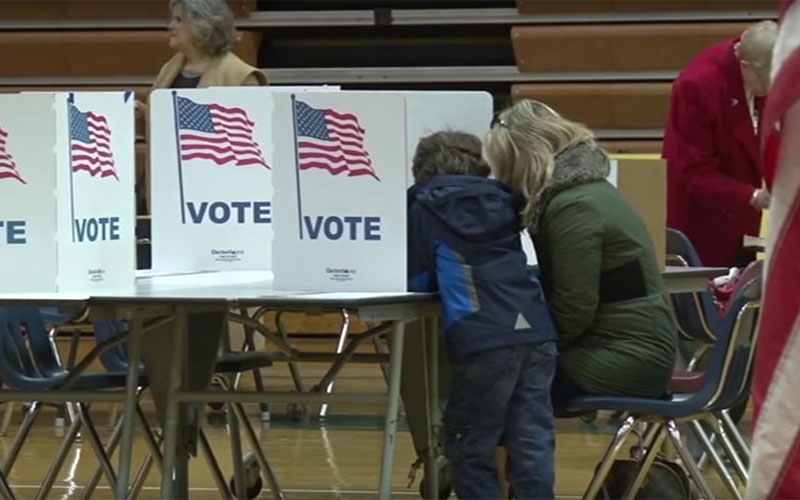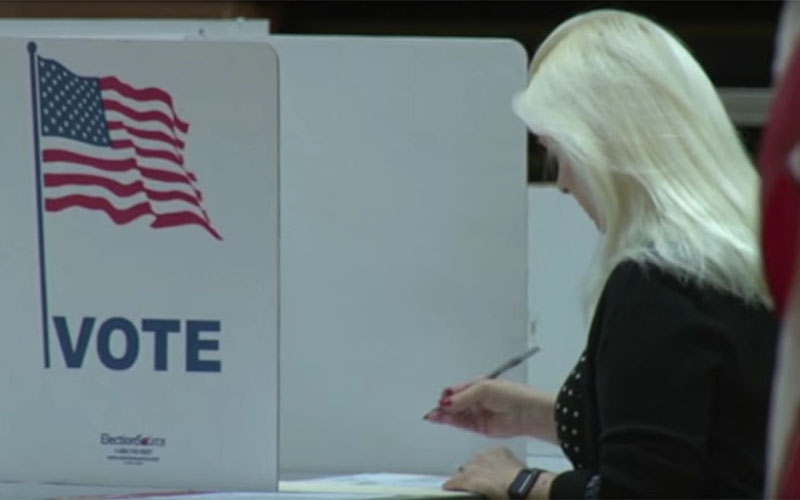
Voters at a Northern Virginia polling place during the 2016 presidential primary. A new report suggests Arizona may better represent the U.S. electorate than most states. (Photo by Samantha Witherwax/Cronkite News)

Arizona was fourth on the list of states whose electorate looked most like the U.S. The report looked at education, economics, demographics and a host of other factors. (Photo by Samantha Witherwaz/Cronkite News)
WASHINGTON – Arizona voters fell in line behind other primary states and backed presidential front-runners Donald Trump and Hillary Clinton Tuesday – not that surprising considering a new report that says Arizona’s electorate closely mirrors the U.S.
Despite its reputation as a home to mavericks, Arizona was the fourth-highest on a list of states that most closely resemble the nation’s electorate based on education, income, religious outlook, demographics and a slew of other factors.
“It was actually pretty surprising that Arizona ranked so highly,” said Jill Gonzalez, an analyst for WalletHub, which did the report.
The state trailed only Illinois, Florida and Michigan, while early primary states like Iowa and New Hampshire finished much lower.
The WalletHub report drew on statistics from the Pew Research Center, the Census Bureau and the political website, iSidewith.com, among others to generate its rankings. It assigned weights to 31 categories to come up with a score and a percentage claiming to show how close each state was to the national average.
Arizona got a fourth-place finish for its electorate representation score of 92.6 percent.
That wasn’t what the study’s authors expected, Gonzalez said.
“When we started seeing big primary states like New Hampshire and Iowa were scoring low, it was pretty shocking,” she said.
High-profile early primary and caucus states that have been narrowing the field of candidates for the rest of the nation are much less like the rest of the nation, according to the report. It said Iowa, New Hampshire and South Carolina – three of the first four states to hold primaries or caucuses this year – ranked 17th, 44th and 32nd, respectively, in the study.
Iowa got an index score of 89.3 percent, New Hampshire got 82.1 percent and South Carolina finished at 86.7 percent in the study. Because of that disconnect, Gonzalez said now may be the time to rethink how the presidential primaries are organized.
In preliminary returns from Tuesday’s voting, real estate mogul Donald Trump, the overwhelming Republican front-runner so far, captured 47 percent of the GOP vote to Texas Sen. Ted Cruz’s 25 percent.
On the Democratic side, former Secretary of State Hillary Clinton extended her lead, getting 58 percent of the vote to Vermont Sen. Bernie Sanders’ 40 percent.
In other states up for grabs Tuesday – states that fell far below Arizona on the similarity index – Sanders and Cruz both won Utah and Sanders won the Democratic caucus in Idaho, according to published reports.
Gonzalez said there were some areas where Arizona was not on the same page at the rest of the country. Public
opinion and socio-demographics, for example, were a “bit off” for Arizona, which she noted has twice the Hispanic population and not all the same political beliefs as the rest of the nation.
But when it came to economic factors and religion, some of Arizona’s numbers were “nearly identical” with the rest of America. For example, 82 percent of Arizonans said they are absolutely or fairly certain in their belief of God, according to the Pew Research Center figures cited in the WalletHub report. Nationally, that number is 83 percent.
“If the economy is an issue that you care about, or if religion is your main platform, then Arizona should be a state to focus on,” for candidates, Gonzalez said.
– Cronkite News video by Lauren Clark